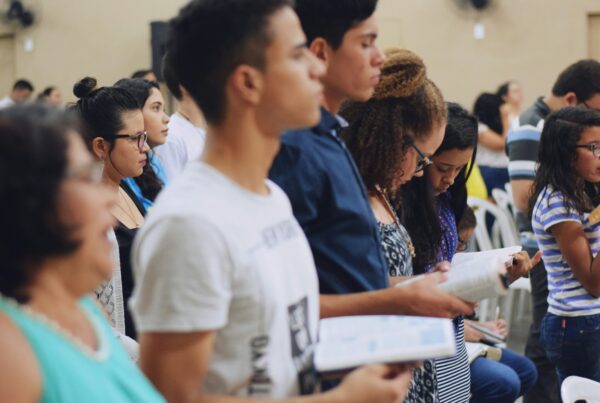T here are advantages and disadvantages to returning from death and living with a resurrected body. On one hand, everything is now accessible. Locked doors pose no barrier, and Jesus quickly takes advantage of this new ability (John 20:19, 26). On the other hand, people look at you funny when you start reappearing. Typically-bodied people are easily frightened and might accuse you of being a ghost (Luke 24:37). They might even start to poke and prod you, just to see if your wounds are there (John 20:27).
All things considered, it is just as well, then, that Jesus returned to the Father. In acting through his followers in the power of the Holy Spirit, Jesus promises to do greater things than he was able to do while on earth (John 14:12). Christ sends the Spirit of truth to be with his disciples (John 14:16-17), and his Spirit unifies Christians with God and each other as we love one another (e.g., Ephesians 4:2-3; John 14:15, 21; 1 John 4:7). We have not been left alone, and Jesus has promised to be with us until “the end of the age” (Matthew 28:20).
Communion is real
During the two years of the COVID-19 pandemic, I wrestled with online church. It has its advantages. Online church is convenient. We live a good 50-minute drive from our lutheran church congregation, and I enjoyed the extra couple of free hours in my Sunday routine. As a credentialed pastor serving people with intellectual and developmental disabilities, I saw the way people at increased risk of illness or death were able to participate online. It doesn’t work for everyone, but, for many people, the introduction of virtual services was the first time they were able to access spiritual community and connection that they had been missing out on. It was a lifeline during lockdowns. However, I also take seriously the need to be present to one another as the body of Christ. Some of the most profound moments of my life have been times of celebrating communion when I have looked around the sanctuary to see the faces of people whom I love.
It was early in the pandemic, though, that I realized that God does not become virtual just because we are online. Christ is actually present to us as we go about our day. As the body of Christ, communion with believers around the world has never been limited by internet bandwidth. One of the reasons why communion is so significant is because we know that, by the power of the Holy Spirit, we are joined across the ages and around the world with a “great cloud of witnesses” who have gone before us and who join us across time and space in remembering the body and the blood of Christ. Despite grieving the loss of in-person fellowship, celebrating communion together has been one way we are reminded that Christian unity transcends space and time.
Being Christ’s body together
After months of at-home worship, I looked forward to worshipping together in person again. My family is great, but I saw them a lot in those months of staying home. My longing to be in-person with a diverse group of people united in Christ is not something I will forget. I hope and pray that this experience drives us to make our communities as accessible and welcoming as possible, so that most people will not face barriers if they wish to join us in person. We can even arrange transportation for those for whom getting to church is a challenge. There are many easy ways to begin on this journey to accessibility, and Everybody Belongs, Serving Together offers tools, resources, stories, and tips to help make this possible.
At the same time, I have counselled support staff who had lost someone to COVID-19. The risks remain very real and potentially deadly for many of our siblings in Christ. There are reasons why so many people who are disabled or immuno-compromised did not feel safe or welcomed in church even before the pandemic. We must address these barriers where we can, but also not cut off the lifeline that has made Christian community possible for so many people through the pandemic years. We will need to meet with people as friends and for spiritual support in homes and where they’re at, for just because people can’t join in-person church doesn’t mean we can neglect in-person companionship and encouragement. Learning how to relate well and safely with people who have been marginalized by our typical church experiences will help us all to learn better what it means to love our neighbour as ourselves and to experience the whole Body of Christ in all its wondrous diversity.
Top-secret technology
Despite being a pastor with a Ph.D. in theology, God still hasn’t revealed to me how Christians are “one” with Christ and each other through the Holy Spirit. I do know, however, that Jesus has met us in and through the better-known technology of the internet. He has joined us in Zoom singing gone wrong (as it does), moments of vulnerable sharing and encouragement, virtual Christmas pageants, and even in online communion. We still have a lot to learn about how best to create meaningful and participatory community online and how to be formed as disciples through a virtual medium. In the COVID-19 years, though, we have travelled new worlds together in practicing how to be the body of Christ across time and space, particularly with those who might not be able to access in-person services. Jesus has joined our online church in the faces of sometimes just the two to three people who have gathered. Let’s make sure not to disconnect, even as we enjoy safe, accessible, in-person services again.

Keith Dow
Keith lives near Ottawa, Ontario (Canada), where he works as Manager of Organizational and Spiritual Life with Christian Horizons, a faith-based organization serving people with intellectual disabilities in Canada and around the world. He is the author of Formed Together: Mystery, Narrative, and Virtue in Christian Caregiving (Baylor, 2021) which arose from his Ph.D. in theological ethics through Vrije Universiteit Amsterdam. Keith is a credentialed pastor with BIC Canada and serves on the core council of the Institute of Theology and Disability. He loves to talk about theology, fostering belonging in church communities, and making maple syrup. You can learn more about his writing and ministry at keithdow.com.



